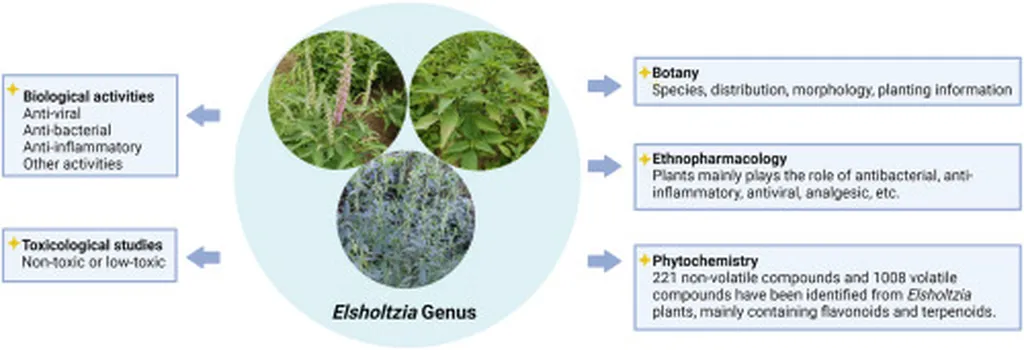In the quest for sustainable and effective alternatives to antibiotics in poultry farming, a recent study published in *Poultry Science* offers promising insights. Researchers led by HuiWei Zhou from the Yunnan Key Laboratory for Wild Plant Resources have discovered that dietary supplementation with the herbal powder of Elsholtzia cypriani, a traditional medicinal and edible aromatic plant, can significantly enhance the immune function of Muscovy ducks. This finding could revolutionize the agricultural sector by providing a natural and efficient way to boost poultry health and productivity.
Elsholtzia cypriani, known for its antibacterial, antioxidant, and immunomodulatory properties, has long been used in traditional medicine. However, its potential as a feed additive has remained largely unexplored until now. The study identified geranial and neral as the principal constituents of E. cypriani essential oil, which exhibited significant inhibitory effects against harmful bacteria like Escherichia coli and Salmonella anatum. This is a crucial step towards understanding the plant’s bioactive components and their potential applications in poultry farming.
The feeding trial conducted on medium-sized white-feathered Muscovy ducks revealed that while growth performance and slaughter rate did not see significant improvements, the ducks’ appetite was notably stimulated. This led to increased feed intake and weight gain, which are critical factors for poultry farmers. “The ducks showed a marked increase in feed intake, which is a positive indicator of their overall health and well-being,” noted lead author HuiWei Zhou.
One of the most significant findings of the study was the enhancement of the ducks’ systemic antioxidant capacity. Dietary supplementation with E. cypriani resulted in increased glutathione peroxidase (GSH-Px) activity and significantly reduced malondialdehyde (MDA) content. This suggests that the plant can effectively activate the endogenous antioxidant system, providing a robust defense against oxidative stress. Additionally, the study observed a considerable improvement in the inflammatory status of the ducks, with significant reductions in pro-inflammatory cytokines IL-1β, TNF-α, and IL-6.
The impact of E. cypriani on gut microbiota was another key focus of the research. Supplementation led to elevated levels of acetic acid and an enrichment of fiber-degrading microbiota such as UBA11471 and Bacteroides H massiliensis. This indicates that E. cypriani may promote short-chain fatty acid production by modulating the gut microbiota composition, which is essential for maintaining gut health and overall immune function.
The implications of this research for the agricultural sector are profound. As the demand for sustainable and antibiotic-free poultry farming practices grows, natural feed additives like E. cypriani offer a viable solution. By enhancing immune function and gut health, these additives can improve production performance and reduce the reliance on antibiotics, ultimately leading to healthier poultry and a more sustainable agricultural industry.
This study not only underscores the potential of E. cypriani as a natural feed additive but also paves the way for further research into plant-based alternatives to antibiotics. As HuiWei Zhou and colleagues continue to explore the benefits of traditional medicinal plants, the future of poultry farming looks increasingly promising. The findings published in *Poultry Science* represent a significant step forward in the quest for sustainable and effective solutions to the challenges facing modern agriculture.

